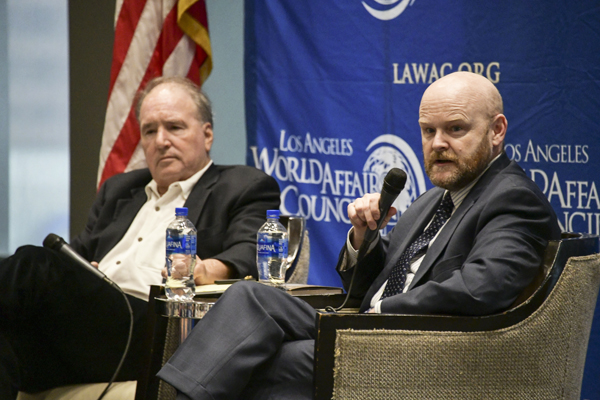 Derek Shearer and James M. Lindsay (right) discuss America's changing role as the leader of the world.
Derek Shearer and James M. Lindsay (right) discuss America's changing role as the leader of the world.
James M. Lindsay, Senior Vice President at the Council on Foreign Relations, spoke to LAWAC members about the global leadership of the US and China’s potential role in the future world order. Lindsay was joined by moderator Derek Shearer, Director of the McKinnon Center for Global Affairs at Occidental College.
Lindsay discussed the shift in world leadership that was already beginning to change prior to the 2016 election, saying, “After 70 years, any world order is going to start to show its wear and tear.” However, that change has accelerated into overdrive under President Trump, as he moves away from the postwar foreign policy that favors open markets and strong alliances. “The president promised to disrupt and that’s exactly what he’s done.”
Lindsay ceded credit to Trump for sounding the alarm on China’s predatory trade moves, saying that both Bush and Obama should have done more when they were in office. Beyond this, however, he cited President Trump’s withdrawal from TPP, the Paris climate accord and the Iran nuclear deal, as well as imposing tariffs on allies, as evidence of the US leaving its post as a global leader in favor of a more nationalist foreign policy.
When Shearer asked about who would step in to the US’s role, Lindsay leaned towards no single leader. While he admitted China could be a possibility, he has reservations because “China has too many internal problems,” particularly their aging population and low birth rate. “Everyone wants China’s money, but no one wants to be China.” Despite his belief that the US is ousting itself, Lindsay pointed out that the world might not be ready for that, saying that in every poll that asks whether the US, China or Russia should lead the world, the US has won every time.
Whether the US actually steps aside from its position as a world leader remains to be seen. Lindsay concluded with this memorable reminder: “As Yogi Berra said, it’s difficult to predict the future.”
